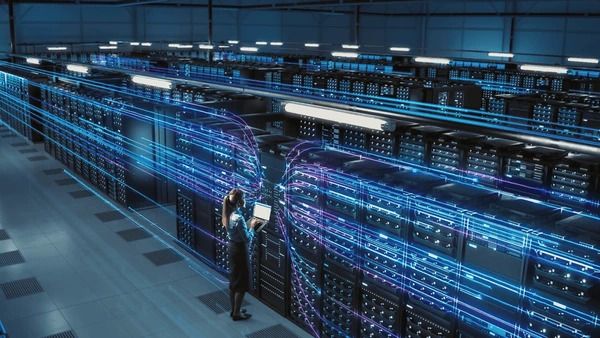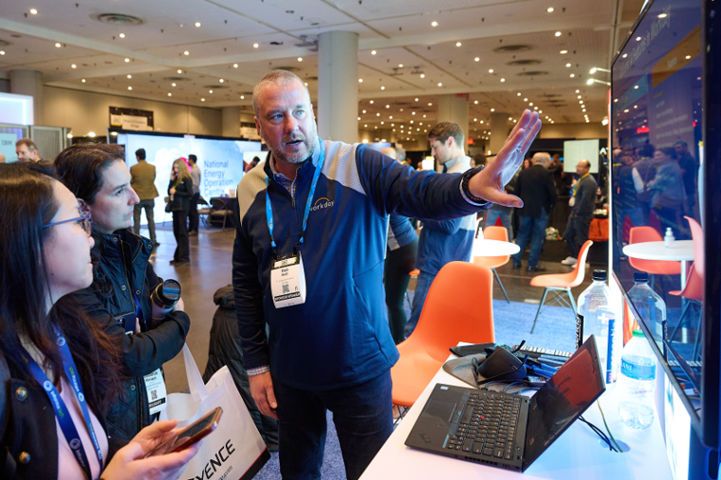Explore the AI in Telecoms Series
Manuel Herranz, CEO, Pangeanic joined Commercial Editor Susie Harrison at the AI Business newsdesk for a wide-ranging discussion on AI.
Introduction:
In this interview, Susie and Manuel discusses the increasing prevalence of AI in society and the key challenges and opportunities it presents. Manuel explains how the recent development of language models that can converse in a human-like manner has surprised and intrigued people. He emphasizes that while AI may be more intelligent and scalable than humans, it does not necessarily have the will to dominate, which is a human trait.
Herranz expresses concern about the potential for AI to be dominated by a few large companies and hopes that open-source AI will prevail. He acknowledges that AI will likely automate many jobs, leading to more free time and the need for a universal basic income. Herranz is excited about the prospects of self-driving cars, digital twins, and AI assistants that can adapt to individual preferences and represent users in various tasks.
Susie Harrison:
Welcome to the AI Summit in New York. I'm delighted to be joined by Panjianik, and this is Manuel, who is CEO of Panjianik. Hello. Thank you for joining us.
Manuel Herranz:
Thank you so much.
AI’s Growing Influence and Public Awareness
Susie Harrison:
So AI is becoming increasingly prevalent in society, business, everywhere. What do you think are the key challenges and exciting elements we can look forward to?
Manuel Herranz:
Let me say, AI was here some time ago. We used to collect technical engineering and engineering solutions. Because of what happened late to 2022, we the public in general has familiarized itself more with AI, because it's the first time in history humans, we humans have had a cognitive experience with a machine.
Human Interaction with AI: A New Cognitive Experience
Manuel Herranz:
We played Nintendo, we played games, we killed martial invaders, face invaders, etc. But that was just a game, there was little interfacing with the machine. For the first time in history, now we chat with something that maybe hallucinates, doesn't tell the whole truth, or tell us something that is not completely right, but sounds incredibly human.
But a light pops in our red tile side of the brain here, and we're shocked, because we don't expect that, we don't expect sheep to talk like humans. Therefore, we don't expect machines to talk like humans, it would be even more difficult.

AI’s Impact on Language and Human Identity
Manuel Herranz:
Humans have realized for the first time in history that their language is not human exclusively. Within education, the language is what diffuses us from the rest of creatures and beings in the world.
Well, that is no longer the case. There’s a lot of possibilities, things that we can do with language tools, create new opportunities.
Will AI Be Dominated by Large Companies?
Susie Harrison:
And do you think the AI ecosystem will be dominated by a few large players? Or do you think, how do you think that space also exists for smaller, perhaps more agile players?
Manuel Herranz:
I think the key word in your question is domination. I hope not, I hope open source becomes the dominant force and driver and that AI is not proprietary, the property of some companies.
Debunking the Fear of AI Dominating Humanity
Manuel Herranz:
The fear of AI becoming the property of several companies is the terminator fear that we have in our brains, that AI will dominate us, and these robots will come and kill human beings and there will be a war.
Well, that's not going to happen simply because we are confused in terms there. We are confused in intelligence with the will to dominate, okay, that is very human and very often the will to dominate does not, how could I say, the will to dominate doesn't match intelligence.
Intelligence vs. Domination: Misconceptions in AI
Manuel Herranz:
Typically, very intelligent people are quite humble and people like me, people that run companies are always happy to employ people that are more intelligent than them because they bring value and they bring resources and assets and knowledge to the company that the CEO cannot have.
The CEO is not super, no CEO is superhuman and I find the pleasure is really rewarding to work with people that are more intelligent than you in many areas. Now, these people typically are not bent on dominating other people, it's people that have that streak or have that will to dominate people that have it.
AI as a Scalable, Non-Dominating Force
Manuel Herranz:
Intelligence is something else, okay, and here we are creating machines that may be as intelligent or more intelligent than humans, definitely more scalable. They can work 24 hours, as long as they apply to electricity, find their work, they don't get tired, all you have to do is change some RAM and more CPUs, so they're more scalable, they're more intelligent, fine.
Domination is not part of the equation, it's not what they're going to do, so we're confusing terms there, because you're intelligent doesn't mean that you need to or you want to dominate. Let's take monkeys, primates, they are driven by a power of domination, humans are as well, or angutans don't have it, or angutans are quite working in a very egalitarian society, you are there and here, fine, as long as you don't eat the sugar cane that I'm eating.

Are Humans Becoming Data Points?
Susie Harrison:
Picking up on the interplay between man and machines, what are people now? Do you think we're just becoming data points?
Manuel Herranz:
To a large extent, yes, sorry to say, to a large extent.
AI’s Impact on the Job Market
Susie Harrison:
What will be the effects of that on-the-job market?
Manuel Herranz:
AI is going to affect the job market. Sam Altman did reflect on this last year and he said that as AI advances and more and more jobs can be automated or large parts, large chunks of labor become AI, well become run down by AI, there's going to be a lot more free time.
The Future of AI: What’s Next?
Susie Harrison:
What are you excited about? What's next in AI? What do you think we can look forward to over the next year?
Exciting Developments in AI: Assistants and Self-Driving Cars
Manuel Herranz:
Self -driving, digital twins, assistants that are updated with your latest data.
Find Out More
Discover the trends, innovations and solutions by attending The AI Summit New York.
)

)
)


)
)

)

)
)
)
)
)
)
)
)
)
)
)
)

)
)
)

)
)
)
)
)

)
)
)

)
)
)
)
)

)
)
)
.svg)

)
)
)
)
)

)
)
)
)

)
)
)
)
)
)
)
)
.jpg/fit-in/500x500/filters:no_upscale())
)


)
)
)
)
)
)
)
)
)
)
)
)

)
)
)
)
)
)
)
)
)
)
)
)
)
)